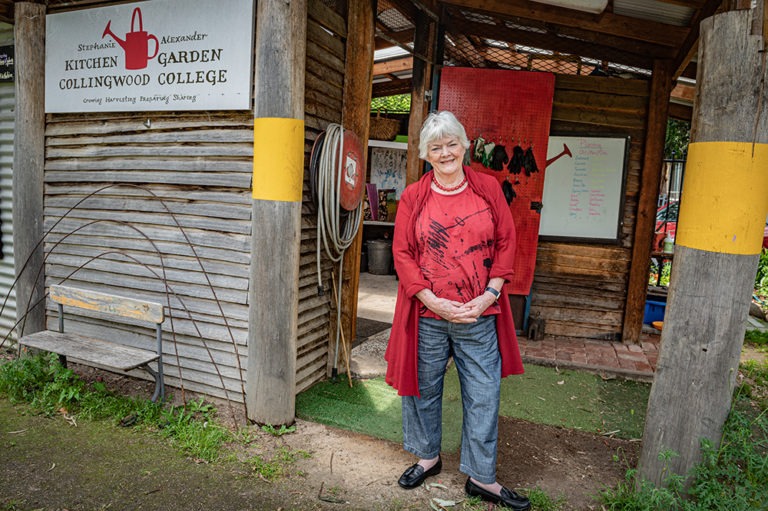When the Australian Curriculum, Assessment and Reporting Authority (ACARA) recently announced that hundreds of references to BMI, weight, calories and diets have been removed from school resources and replaced with terminology such as “balanced nutrition” in a bid to reduce eating disorders and weight stigma, the reaction from celebrated cook and food writer Stephanie Alexander AO was one of happiness – and a healthy dollop of pride.
“As we celebrate 20 years of working to promote pleasurable food education, it is especially gratifying to hear and see more and more research bodies, food writers, and academics validate my approach,” she said in a statement this week.
“Appreciating and choosing fresh food and incorporating it in daily meals will lead to healthier, happier food-aware adults compared with all attempts to change habits by shaming.”

A pioneer of sustainable gardening education
In 2004, the Stephanie Alexander Kitchen Garden Foundation was established to support children and young people in having positive and preventative health education through engaging, hands-on kitchen and garden classes.
Her globally recognised approach to food education was ahead of its time – but in the year of the organisation’s 20th anniversary, there is still more to do.
The good news, says the foundation’s CEO Dr Cathy Wilkinson, is that barriers involved in becoming a school member of the kitchen garden community are “very low”.
“Part of the messaging behind our 20-year anniversary is diminishing the myth that you need a huge commercial-style kitchen or hobby farm to embrace the Kitchen Garden Program,” she told EducationDaily.
Start small – but dream big
“We encourage schools and early childhood services of all sizes to start small and dream big. Over a thousand schools and services right around Australia are linking learning to the kitchen and garden with positive, lasting effects on student motivation and academic aptitude.”
Dr Wilkinson says current school participants include tiny communities in the Northern Territory, as well as “bustling education hubs in capital cities”.
The common connection, she told EducationDaily is that all of them are “deeply connected to our Program and the resources, recipes, lesson activities, professional development and human support we provide”.

Applications for grants are open
For schools that are under-resourced, the organisation’s biggest annual grant is now open for entries.
The Kitchen Garden Kickstart Grants provides 12 schools with a start-up membership plus $5,000 towards kitchen or garden infrastructure,” Dr Wilkinson says.
“We regularly update grant opportunities on our home page, and often find that just one school fundraiser can cover the cost of membership.”
Bringing communities together
To mark the 20-year milestone in 2024, Dr Wilkinson says there will be many ways teachers, students – and families – can get involved to celebrate the positive impact this unique and sustainable approach to food education has on the diverse range of communities it serves.
“Throughout the year, there will be many ways to get involved to celebrate the impact the Foundation is having on children and young people and their communities,” she says.
“We’re launching more new webinars and face-to-face professional development events for educators who are members of our Kitchen Garden Program. These include in-person full-day training in Adelaide, Hobart, Sydney and Melbourne. Two new webinars, just announced, cover our cross-curriculum links to science and how to benefit from our online resource library and community hub, the Shared Table.”
Food education approach puts pleasure on the plate
Describing their mode of food education as “ahead of its time when it was spearheaded by our Founder, Stephanie Alexander AO”, Dr Wilkinson says the importance and merit of their play-based approach is just as critical and relevant to the health of young Australians as it was 20 years ago.
“Pleasurable food education inspires children and young people to understand and connect with fresh, seasonal, delicious food through fun, hands-on learning in the kitchen and garden,” she told EducationDaily.
“This approach empowers children and young people to lean into the joys of cooking and gardening to develop practical skills, an appreciation of seasonal produce, and a positive, confident and healthy relationship with food — for life.”








